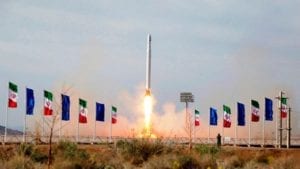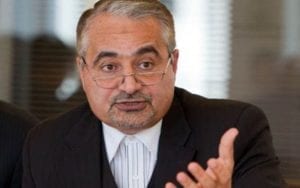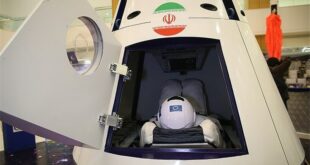
On 22 April 2020 Iran’s Islamic Revolutionary Guard Corps (IRGC) successfully launched a small satellite – the Noor-1 (Farsi for ‘Light’) – on a previously unseen satellite launch vehicle called the Qased. Over the course of this week SpaceWatch.Global is running a series of perspectives on the strategic, political, and geopolitical implications of the launch for Iran, the Middle East region, Europe, and the United States. Today’s perspectives come courtesy of Dr. Seyed Hossein Mousavian of Princeton University in the United States (below), and Professor Gawdat Bahgat of the Near East South Asia Center for Strategic Studies at the National Defense University in Washington, DC, United States (see here).
Why do you think Iran, and the IRGC in particular, carried out the launch when they did given the difficulties the country is facing and has experienced?
Iran has been sanctioned since the 1979 revolution. The world powers, specifically the US and EU, have exported hundreds of billions of the most sophisticated conventional weapon to the Middle Eastern countries. Saudi Arabian and other Arab neighboring countries of Iran have been provided with these weapons. Saddam invaded Iran right after revolution and the Arab neighbors provided money, and the world powers provided full range of weapons for him to disintegrate Iran. During the war, Iran was attacked by thousands of missiles. Saddam used chemical weapons and killed and injured 100,000 Iranians while the US and Europe provided material and technology of chemical weapons for Saddam. Since then, the US strategy has been regime change in Iran with all options on the table.
With this reality and history, Iran was forced to strive for self-sufficiency in its economy, industry and conventional arms, cyber and space technology. This has been Iran’s strategy in response to invasion, regime change, and possible US-Israeli military strike. During post revolution era, sanctions have never been successful in stopping Iran, but have rather made Iran more serious to resist and become more self-sufficient.
What, if any, are the implications of the satellite launch for Iranian-US relations as well as the Joint Comprehensive Plan of Action (JCPOA) and the Iranian nuclear programme?
The nuclear deal known as The Joint Comprehensive Plan of Action (JCPOA) was the first serious route of diplomacy between Iran and the world powers, specifically the US. The deal was agreed upon in 2015 between Iran and the world powers; US, Russia, China, France, Germany and the UK.
The JCPOA is the most comprehensive agreement during the history of non-proliferation. The IAEA confirmed that Iran implemented the JCPOA completely and comprehensively with zero failure for 3 years. With the JCPOA, Iran implemented the highest level of transparency measures, and provided most access, which no other member of NPT has ever provided.
But the US withdrew from the deal, violated UN resolution 2231 as well as many IAEA resolutions, and imposed sanction. Practically Iran showed goodwill by complying with the deal and showing the highest level of transparency and cooperation on the nuclear issue, but was rewarded with the most comprehensive sanctions in contemporary history. Unfortunately, the EU fully capitulated to the US unilateral sanctions.
This reality convinced Iran that the West is not trustworthy, and to count on the East for support.
Does the satellite launch have any meaning for Iran’s standing in the Middle East?
Iran is the only country in the Middle East which is self-sufficient on conventional arms. Iranian defense industry has built all range of weapons from jet fighters, missiles, tanks, to submarines. The new success on satellite launch strengthens Iran’s standing in the Middle East, proving self-sufficiency and resistance is the best way forward.
Why do you think the IRGC has created its own Space Command?
The IRGC has had its own space program and command for many years.
In your opinion, how should the Iranian government respond to criticism of the IRGC satellite launch?
The Iranian government fully supports the advancement of the country on conventional arms to defend the existence and integrity of the country. On this matter, IRGC plays a key role.

Seyed Hossein Mousavian is a Middle East Security and Nuclear Policy Specialist at the Program on Science and Global Security. He is a former diplomat who served as Iran’s Ambassador to Germany (1990-1997), Head of the Foreign Relations Committee of Iran’s National Security Council (1997-2005), Spokesman for Iran in its nuclear negotiations with the international community (2003-2005), Foreign Policy Advisor to the Secretary of the Supreme National Security Council (2005-2007), Vice President of the Center for Strategic Research for International Affairs (2005-2009), General Director of Foreign Ministry for West Europe (1987-1990), Chief of Parliament Administration (1984-1986), and the editor-in-chief of the English-language international newspaper Tehran Times (1980-1990). Mousavian earned a PhD in international relations from the University of Kent, United Kingdom.
 SpaceWatch.Global An independent perspective on space
SpaceWatch.Global An independent perspective on space




